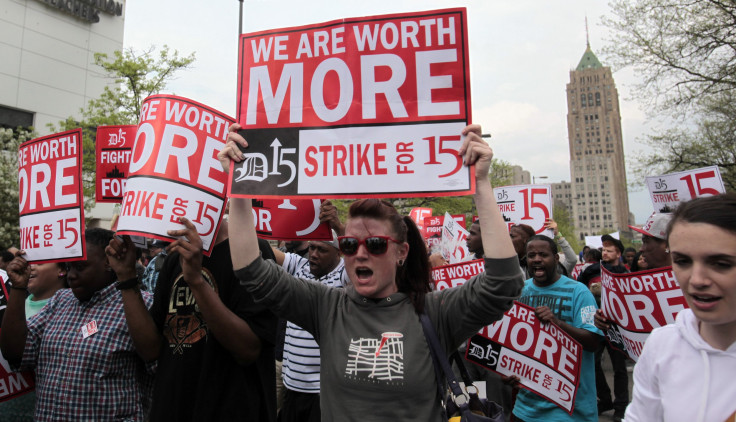Minimum Wage 2015: Michigan Poised To Block Local Control Of Hourly Pay, Benefits

Michigan is one step closer to banning cities and towns from setting their own labor standards, including minimum wages. On Tuesday, the Republican-dominated state House approved a bill that would bar municipalities from increasing the minimum wage, require employers to provide paid sick leave and implement so-called ban-the-box measures that rein in the ability of employers to inquire about the criminal backgrounds of prospective hires.
The legislation -- which opponents deem the "death star" bill -- comes as labor advocates nationwide intensify efforts to pass pro-labor measures on the municipal level.
“It would obliterate local control in Michigan, just as the Death Star obliterated Alderaan in 'Star Wars: Episode IV,' " East Lansing Mayor Nathan Triplett told the Washington Post.
The Michigan Senate is expected to approve the bill this week. Both chambers have already passed a version of the legislation, but the current version does not apply to any city ordinances passed before October 2015. Gov. Rick Snyder is expected to sign the bill into law.
Supporters include heavy hitters on the political right such as the state chamber of commerce, restaurant association and nonunion builders and contractors association. These groups traditionally oppose efforts to extend new benefits to workers or increase wages. The state's hourly minimum rate stands at $8.15, slightly above the federal floor of $7.25.
The bill's sponsor, Rep. Earl Poleski, a Republican, says it's about maintaining a competitive environment and attracting new investment. Complicated regulations send a bad signal to business: "We haven't seen many [labor-related] ordinances, but we've seen them in different states. The idea is to avoid that sort of regulatory discrepancy."
Critics charge conservative backers with hypocrisy for abandoning their commitment to small government. “When conservatives claim a deep-seated respect for local control, this belies that," Ellen Bravo, executive director of the group Family Values @ Work, which advocates for paid leave policies, said earlier this month.
The proposal is a strong rebuke to the efforts of labor activist groups like the Fight for $15, which over the past year have won an improbable string of minimum wage hikes in liberal-leaning cities and towns. Los Angeles recently approved a $15 hourly pay floor by 2020. St. Louis and Kansas City, Missouri, are both considering similar proposals. Smaller cities are getting in on the action, too: Activists in Tacoma, Washington, recently submitted the requisite amount of signatures to qualify for a voter initiative on a $15 wage this November.
So-called preemption bills have surfaced nationwide, as labor-backed campaigns to boost wages and extend benefits gain momentum at the local level. The conservative American Legislative Exchange Council and its locally oriented sister organization, the American City County Exchange, have crafted model legislation to this effect, which sympathetic legislators have introduced in a number of states. Proposals have gained traction in Republican-dominated state governments such as Michigan.
Last year, Oklahoma approved laws that block cities from raising minimum pay or mandating that employers provide paid sick leave. Pennsylvania legislators voted earlier this year to block Philadelphia's new paid-leave policy from taking effect, but Democratic Gov. Tom Wolf has stymied that plan so far. Another proposal similar to Michigan's awaits the signature of Missouri Gov. Jay Nixon, a Democrat. Nixon has not yet announced his plans.
© Copyright IBTimes 2024. All rights reserved.






















